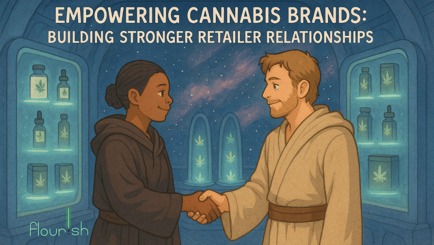
Behind every strong, self-sustaining brand, you’ll find careful brand development. When you hear the word “brand”, a colorful logo might flash through your mind. That’s a great example of brand recognition, but a reliable brand goes beyond its logo and extends to every consumer’s experience. If brand recognition is all you focus on, it’s going to be a race to the bottom for your company.
What is brand recognition?
Brand recognition simply means your brand is so distinct that it’s immediately recognized under certain pretenses; safe to say that’s every brand’s goal. If you’re in the cannabis industry and you’re not capitalizing on brand recognition - do it. It’s not your only focus, but it’s important in this space. Stay away from “canna” in your name, green logos, and cannabis leaves to differentiate.
It’s easy and logical to be covered in green because this clearly conveys who you are as a cannabis business. The problem is: there are plenty of businesses already doing the same thing, whether they are cultivators, a CBD company, a dispensary, a staffing company - you get the idea. This branding style isn’t bad, but if you’re trying to stand out in cannabis, find a less saturated approach.
According to Hardik Tuteja, Flourish Software’s Director of Flow, “Brand recognition is a byproduct of a great customer experience, that goes beyond the product itself. A good customer experience takes into account every touchpoint a customer may have with the brand. Below are key points where brands should focus on making sure they are delivering a consistent messaging aligned with their brand’s objectives:
- Website – this is the digital face of the brand
- Email marketing
- Customer Support Center
- Social media
- SEO
- Online advertisements
- E-commerce store
- Retail store experience – having budtenders well informed and trained about products. Having merch sales etc
- Follow up experience
- Point of sale”
Real-life cannabis examples
Berner’s brand, Cookies, is the trailblazing example of a job well done when it comes to cannabis brand recognition. If you’re into cannabis, you know the Cookies blue when you see it. Even their dispensaries are blue, so they’re easy to spot when you’re driving. Their packaging is the same blue, and the importance of brand recognition carries over to their other brands like Lemonade, Minntz, and Collins Ave.
Let’s dig into Cookies a little bit more. Beyond the blue is the classic Girl Scout Cookies strain every cannabis enthusiast knows. Berner founded the company alongside Jai, the expert cultivator behind our beloved strain. Cookies the brand is off to a great start with a solid product.
Book a demo today and learn how we help your product stay consistent.
Looking at brand consistency
According to Hardik Tuteja, Director of Flow at Flourish Software, “brand recognition will get you in the hands of the consumer, but for them to be a recurring customer: the consistency has to be there. Imagine buying a brand you are fascinated by and then the product isn’t good. You will never buy it again.” Cookies is careful to partner with those who will represent the brand well, especially when it comes to cultivators because their customers expect a consistent product.
So, which one is more important? The answer is both. Both factors are important for a brand to be successful. “Without recognition, no one will buy the product but without quality, no one will continue buying the product.”, said Tuteja.
Pulling from Tuteja’s previous point, imagine buying a product with awesome branding that resonates with you. You feel like the brand cares about the same things you do, maybe they even have nice packaging you like, and you could really use what they’re selling. So you buy it and you hate it. That sticks in your mind! It sticks in your mind more than it would have if you didn’t make that emotional connection with the brand first. Have you ever heard someone say “I really WANTED to like this, I just didn’t.” They wanted to like it because they liked what the brand was telling them on the package or on social media, but they didn’t like the product inside.
The chances of getting a customer like that to come back and try again are very slim, so that’s why it’s important to get them the first time around. Especially in cannabis. People rely on cannabis for their wellness, it’s not just laundry detergent or a piece of candy. “When brands are consistent, consumers continue to buy their product as they find it reliable to have that consistent and expected experience. This makes loyal recurring customers, who also become advocates,” said Tuteja.
According to Tuteja, here’s what cannabis companies need to focus on as they strive for consistency:
- Raw material supply and vendors need to be consistent
- Standardize routine processes
- Ensuring those standard processes are being executed at all times
- Written SOPs help, that way everyone can comfortably refer back to it without feeling like they have to ask someone for help
- Implementing quality control post-production
- This helps prevent things like mold issues, poor trim jobs, and low-quality drying & curing.
- Focusing on quality vs quantity. Ex: tracking employee performance based on quality not on quantity
Final thoughts
“Cannabis producers and consumers are connected not just by the product but by the culture and the voice. The community is very focused on the people so having a story is key to creating a brand identity on top of the standard stuff like customer service and branding,” Tuteja said.
“Regardless, whether you’re B2B or B2C, every business is selling to people and brand recognition is about psychology so no matter who your customer is: these concepts are important. Any business should have time and energy spent towards these elements – this is their face, their voice, their personas out in the market. So it’s crucial to ensure success.”




